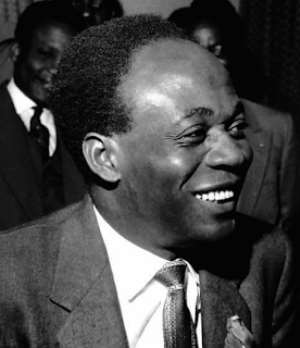
Kwame Nkrumah's effort to liberate the entire African state from the hands of colonial oppression generated hate leading to his overthrow
One of the main goals of Europe creating colonies in Africa was to establish control over the continent’s raw materials. The exploitation of the raw material wealth of the colonies was ensured by the following measures:
- · The transformation of the colonies into dependent territories where there is no industrial production.
- · To prevent colonial subjects from acquiring the knowledge and skills necessary to establish their own industrial production.
- · The transformation of the colonial "subjects" into low-paid producers of exclusively raw materials
- · Prohibiting colonies from trading with other states other than through their “motherland.”
For example, this what Britain did in its African colonies. It controls the export of raw materials from the colonies, prohibiting colonial subjects from supplying them directly to foreign markets. This is done in order to sell the surplus to other states, having obtained huge super profits, by meeting the needs of its industry.
A colonial farmer working on the market does not receive anything from these profits. It can be argued that the colonial powers spend part of these profits to pay for public works, the development of the health care system and “loans.”
Usually, they forget the main thing: the funds for these "loans" come from taxes on colonial "subjects", profits from the sale of agricultural products produced by them and the mineral resources they extracted. Most loans are spent on the salary of European officials.
The data published in the latest White Paper, released by the Ministry of Colonies, suggests that the British government made a huge profit, £ 367,653, from the exploitation of 800,000 families of peasants living in the West African colonies. This is how it was done. The Cocoa Sales Authority was created, which was subordinate to the Ministry of Colonies, and acted "on behalf of" the cocoa producers of West Africa.
The office was empowered to purchase the entire crop of cocoa beans and set purchase prices that were paid to the peasants. In addition, it was responsible for the sale of cocoa beans on the world market. During the period from 1939 to 1943, the Office squeezed out of the peasants the above profit.
This profit was generated because the African peasant received 1.4 pence per pound of cocoa beans (2.5 cents), the same pound sold for 4 pence (8 cents) in London or 4.5 pence (9 cents) in New York. The cost of living for the African peasant increased, the demand for products increased, yet the income fell while at the same time, monopolistic cartels producing chocolate, made super-profits.
A colonial citizen cannot successfully engage in any business since the wholesale prices that set up monopoly cartels do not allow him to get at least some profit. In addition, a secret agreement has been concluded between cartels and manufacturers, under which local entrepreneurs cannot directly purchase goods from manufacturers.
No matter what price the African will offer, he will still be sent to European wholesalers who work for monopoly cartels. Surprisingly, years after independence swept through Africa, Africa hasn’t fully recovered from the scars of colonial economic oppression, firstly because, they still look for support from the colonial masters that hurt them and secondly, their endless love for correction.
Therefore, are African leaders not tired of repeating the mistakes they did to relieve itself of the “white man’s burden”, which has set back developments in Africa, resulting in peoples who are deprived of rights, humiliated, robbed and reduced to the level of livestock?




 Dumsor: Don't rush to demand timetable; the problem may be temporary — Atik Moha...
Dumsor: Don't rush to demand timetable; the problem may be temporary — Atik Moha...
 Space X Starlink’s satellite broadband approved in Ghana — NCA
Space X Starlink’s satellite broadband approved in Ghana — NCA
 2024 election will be decided on the grounds of the economy; choice of running m...
2024 election will be decided on the grounds of the economy; choice of running m...
 Dumsor: We're demanding less; just give us a timetable — Kwesi Pratt to ECG
Dumsor: We're demanding less; just give us a timetable — Kwesi Pratt to ECG
 Do I have to apologise for doing my security work, I won’t – Simon Osei-Mensah r...
Do I have to apologise for doing my security work, I won’t – Simon Osei-Mensah r...
 All my businesses have collapsed under Akufo-Addo — NDC Central regional chair
All my businesses have collapsed under Akufo-Addo — NDC Central regional chair
 Military, Prison Officers clash in Bawku, three injured
Military, Prison Officers clash in Bawku, three injured
 GRA-SML contract: MFWA files RTI request demanding KPMG report
GRA-SML contract: MFWA files RTI request demanding KPMG report
 Court threatens to call second accused to testify if NDC's Ofosu Ampofo fails to...
Court threatens to call second accused to testify if NDC's Ofosu Ampofo fails to...
 Family accuses hospital of medical negligence, extortion in death of 17-year-old...
Family accuses hospital of medical negligence, extortion in death of 17-year-old...
